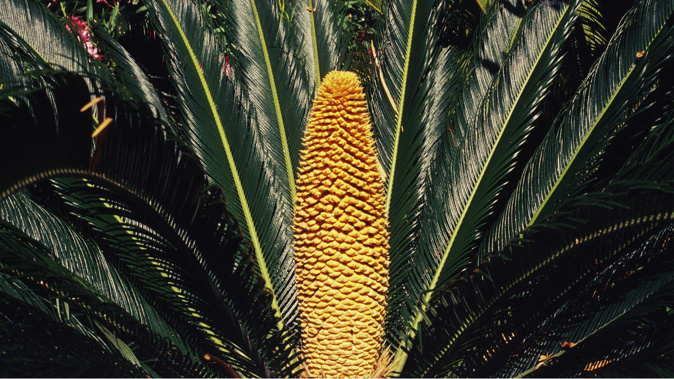
A tropical plant has produced male and female cones outdoors in the UK for the first time in 60 million years, in an event that botanists say is a clear indication of climate change.
Two cycads (cycas revoluta), a type of primitive plant that dominated the Earth's flora 280 million years ago, have produced cones on the cliffs of a botanic garden on the Isle of Wight, off England's south coast.
"This can be seen as further evidence from the plant kingdom of climate change in action. Certainly this sort of plant could formerly not be considered hardy in the UK; the recent heatwave has contributed to the individual cone growth," Ventnor Botanic Garden said in a statement.
Native to southern Japan and the Ryukyu Islands, cycads -- also known as Japanese sago palm -- are only found on steep limestone cliffs and are native to warmer parts of the world.
Because of the Isle of Wight's microclimate and the sheltered location of the garden, plants can be grown at Ventnor which would not usually survive in the British Isles.
A spokeswoman from the Ventnor Botanic Garden told CNN that the island is on average 5 degrees Celsius warmer than the rest of mainland Britain.
A tropical plant has produced male and female cones outdoors in the UK for the first time in 60 million years, in an event that botanists say is a clear indication of climate change https://t.co/9L7xCXGcJt
— CNN (@CNN) August 24, 2019
"Fifteen, 20 years ago we started growing cycads -- it started as an experiment, something you wouldn't normally do," Chris Kidd, curator at Ventnor Botanic Garden, told CNN.
"Fifteen years on, they're not only surviving winters, growing and producing leaves. Five years ago we had a male cycad that produced a cone, and this year we have a male and female both producing cones," he said.
"This is the first time that cycads have produced male and female cones in the British Isles since 60 million years ago," he added.
"It is a clear indication that hotter summers and milder winters are triggering this phenomenon," the Botanic Garden said in a statement.
Cycads were previously found in what is now the UK millions of years ago, during the Jurassic period, and pieces of fossilized extinct cycads have even been found in the cliffs of the Isle of Wight.
"The direction of travel with climate change is very profound. We're getting plants that you wouldn't normally get to grow outdoors growing outdoors, cycads producing cones, which is quite extraordinary," Kidd said.
The term climate change is used to describe a long-term change in global temperatures and weather patterns.
Today, climate change is commonly used as a term to describe the effects of global warming that have occurred as a result of human activity following the industrial revolution in the 18th century.
Humans have damaged around a quarter of ice-free land on Earth, United Nations scientists warned in a major report in August, stressing that further degradation must be stopped to prevent catastrophic global warming.
"This could be seen as exciting for British gardeners but if you can see the climate changing so dramatically in such a short range of time, it's very minor when you consider what could be happening elsewhere in wider agriculture, horticulture, and socially, for geo populations on the planet," Kidd said.
Kidd told CNN that botanic gardens had recently been able to grow other plants that would usually be found in warmer climates -- including giant geraniums from Madeira, and other "hugely exotic" flora.
Take your Radio, Podcasts and Music with you









